A senior Iraqi lawmaker said that the recent rocket attack on the terrorist Mojahedin-e Khalq Organization 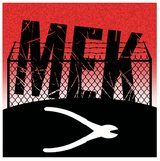 transient settlement in Camp Liberty was a move to convince Iraq to allow the MKO to return to Camp Ashraf, but such actions are futile the group’s return to its main training camp is impossible.
transient settlement in Camp Liberty was a move to convince Iraq to allow the MKO to return to Camp Ashraf, but such actions are futile the group’s return to its main training camp is impossible.
"Attack on the MKO aimed to rally the support of the international community’s public opinion for the MKO’s return to the Diyala province and Camp Ashraf," Abdullah al-Naeli said on Wednesday.
"But returning the MKO’s members to their previous position is not possible, specially given the fact that Diyala residents spent much efforts to expel them from their province," Naeli was quoted by Ashraf News as saying.
The Iraqi lawmaker added that the Baghdad government is seriously investigating the attack to find out the realities.
Some media reports alleged that Katyusha rockets fired on the Camp Liberty, the transient settlement facility of the MKO (also known as the MEK, PMOI and NCR) in Iraq, have killed five members of the MKO. About 40 members of the terrorist group were reportedly wounded in Saturday’s attack, along with three Iraqi policemen.
Speaking to reporters here in Tehran on Tuesday, Iran’s Foreign Ministry Spokesman Ramin Mehman-Parast said that the move is part of the MKO’s efforts to portray itself as an oppressed community in a bid to postpone its expulsion from Iraq’s soil.
Mehman-Parast also called on the UN and Iraqi officials to rapidly implement the agreements on the expulsion of the MKO from Iraq.
Also on Tuesday, Iran’s Ambassador to Baghdad Hassan Danayeefar said that the attack is part of the MKO’s efforts to return to Camp Ashraf.
Iraq
Head of an Iraqi human rights group says Iraq seeks to try in absentia the members of the terrorist Mujahedin-e ![]() Khalq organization (MKO, a.k.a. MEK and PMOI) in Iraq.
Khalq organization (MKO, a.k.a. MEK and PMOI) in Iraq.
“The silence of the Iraqi government, international organizations, and the mass media regarding the martyrs and victims of Munafeqin (hypocrites, a term used in Iran and Iraq for the members of MKO) grouplet made us request the hearing in the absence of the Munafeqin,” head of the Association of Justice to Defend Iraqi Victims of MKO, Dr. Nafe al-Isa, told Habilian Association in an interview on Thursday.
He said the people of Tuz Khurmato, who are victims of the MKO and the trial is going to be held in their city, expressed happiness and satisfaction over the issue.
He added that the trial will be held as coordinated with the judicial system, and the witnesses will be heard in the first session.
Dr. Nafe al-Isa also called on Iranian media to cover the sessions, the first of which will be held on February 18, 2013.
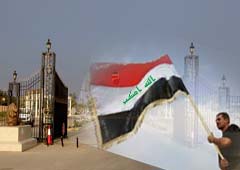 Mujahedin-e Khalq organization is not complying quickly enough with the Iraq’s calls on the terrorist group to complete the move from its former military camp. So the Diyala provincial officials are giving the grouplet a new deadline to fully evacuate Camp Ashraf.
Mujahedin-e Khalq organization is not complying quickly enough with the Iraq’s calls on the terrorist group to complete the move from its former military camp. So the Diyala provincial officials are giving the grouplet a new deadline to fully evacuate Camp Ashraf.
According to a report published by Habilian Association, a human rights NGO formed of the families of over 17000 Iranian terror victims, a responsible source in the town of Khalis, 50 km north of Baghdad where Camp Ashraf is located, said the officials have set the February 9, 2013, as the new deadline for MKO to withdraw all its members from the Camp Ashraf.
The source added that the Diyala Operations Command is responsible to inform the remaining elements of the MKO in this regard.
The relocation is in line with the memorandum of understanding signed on 25 December, 2011, between Iraq and United Nations to temporarily transfer members of the terrorist MKO group to a former U.S. military base near the Baghdad International Airport for the UNHCR to determine their refugee status.
So far, over 3100 of the group’s members have been transferred to their transient home in Camp Liberty. Although the Iraqi government’s patience is wearing thin and has repeatedly insisted the closure of the Camp Ashraf, about 100 of the MKO members, who were due to leave shortly, are still at the camp to “sell their property” in there.
MKO is a heavy burden on Iraq whose potential threats have to be drastically curbed
Despite the UN’s efforts in negotiating with immigrant-accepting countries to convince them to 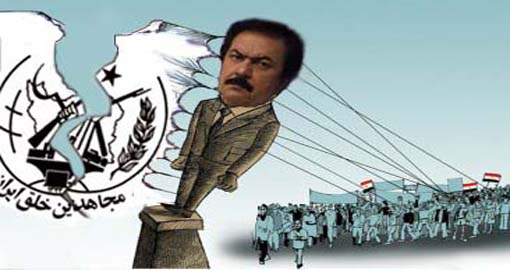 accept and shelter the MKO members, no country has yet agreed to let them on its soil as refugees. Labid al-Abawi, the Iraqi Deputy Foreign Minister has recently stressed that the Iraqi government has complied with all its undertakings to ensure the rapid expulsion of the terrorist MKO from its soil saying: “The group [MKO] is now in the transit Camp Liberty in Baghdad and the UN will start their transition as soon as a third country is found for them”.
accept and shelter the MKO members, no country has yet agreed to let them on its soil as refugees. Labid al-Abawi, the Iraqi Deputy Foreign Minister has recently stressed that the Iraqi government has complied with all its undertakings to ensure the rapid expulsion of the terrorist MKO from its soil saying: “The group [MKO] is now in the transit Camp Liberty in Baghdad and the UN will start their transition as soon as a third country is found for them”.
MKO is not the Iraqi government’s sole serious problem to tackle with but one of the most complicated among many. Unrest, tribal insurgence and bombing are post Saddam legacies that have to be curbed. Based on official reports, Martin Kobler, the Special Representative of the United Nations Secretary-General for Iraq (SRSG), has strongly condemned the frequent wave of fomented unrests and bombings which have targeted thousands of individuals especially in northern and southern provinces. Expressing his concern, Mr. Kobler states that “I am particularly alarmed that attacks in disputed internal areas further aggravate the tensions there”.
The latest figures from UNHCR show that there are currently more than 70,000 Syrian refugees in Iraq, all fleeing the escalated violence in Syria to seek protection in Iraq. Majority of these refugees suffer from serious lack of basic living needs and the harsh living conditions and there is an ongoing joint cooperation to respond to the pending needs intensified in the camps particularly located in the sub-zero temperatures. Lack of healthcare services, clothing, inappropriate shelters to keep the cold off, the cold weather itself coupled with unhygienic conditions and more shortages have made displaced people vulnerable to a variety of diseases and have left them with no choice but to be engaged in a desperate struggle to survive.
Compared to these poor refuges, MKO’ members, if they insist to be recognized as refugees, are enjoying the convenience of living in an ideal location abundantly provided and left over by the US army. Any life-threatening shortage? Sometimes you cannot tell if MKO’s leaders are talking seriously or just kidding. For instance, they complain why they have to suffer walking on the mud-laden ground at the rainfall or, as they have recently accused Iraqi forces, be deprived of using forklift trucks because “moving of loads by residents during this period of time has led to orthopedic diseases, acute pains in the limbs and backs, and irreparable osteo-lesions”.
In a recent demand pressed by the NCR Secretariat, which MKO claimed to be an effort to end inhuman restrictions in Camp Liberty, the group called on “the United Nations and the US government with specific responsibility towards safety and security of Camp Liberty residents to adopt urgent measures to end torture of residents and inhumane restrictions on them such as depriving them of their own forklift trucks, and also to remove the aforementioned officers from Camp Liberty”. One may ask what the loads are, how heavy and abundant they are and where they have come from to need forklift trucks to carry and stockpile them in a transit camp!
The call comes after the disappointed news that the Iraqi government refused the demand made by MKO to return to the old location they had occupied for more than 25 years calling it City of Ashraf. Asserted by the Chairman of the Commission on Security and Defence and Parliamentary leader of the Coalition of State Law, Hassan al-Sanid, MKO will not return to Camp Ashraf in Diyala province after having been transferred to Camp Liberty near Baghdad. He further notified that “the Iraqi government, in coordination with the United Nations Assistance Mission for Iraq (UNAMI), will act speedily on the mutually agreed resolution to drive them out.”
Besides ceaseless complains and new demands as well as spreading unfounded rumors of a massacre threat by Iraqi forces, MKO denounces the Iraqi government for plotting to plunder “the residents’ property and expropriation of their property, without paying any compensation”. Not only the government but also Mr. Kobler is accused of cooperating to pave “the way for stealing Ashraf resident’s property and third massacre in Ashraf by Al-Maliki at behest of the Iranian regime.
The Iraqi government has so far tolerated the cantankerous, strange behaviors of an imposed remnant of the ousted dictator. Neither are they refugees nor prisoners of war waiting repatriation nor trusted temporary settlers to grant them limited autonomous, self-dependent living. It is just a heavy, unthankful burden provided with free, double rations whose potential threats have to be drastically curbed until they are transferred out of the country. How long more can the Iraqi government tolerate the impudence of the guests who have outstayed their welcome is a question that remains unanswered.
No country in the world accepts to shelter members of the anti-Iran terrorist Mojahedin-e Khalq Organization (MKO), Iraqi Deputy Foreign Minister Labid al-Abawi stressed on Monday. 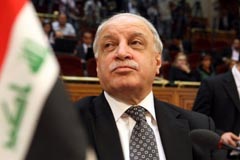
"The UN is in talks with some immigrant-accepting countries to convince them to shelter the MKO members, but no country has yet accepted to shelter them," Abawi told FNA when asked about the latest developments in relation to the expulsion of the MKO members from Iraq.
"The grouplet is now in the transit Camp Liberty in Baghdad and the UN will start their transition as soon as a third country is found for them," he added.
Labawi said that the Iraqi government has complied with all its undertakings in this regard in a bid to ensure the rapid expulsion of the terrorist MKO from its soil.
The MKO is behind a slew of assassinations and bombings inside Iran, a number of EU parliamentarians said in a recent letter in which they slammed a British court decision to remove the MKO from the British terror list. The EU officials also added that the group has no public support within Iran because of their role in helping Saddam Hussein in the Iraqi imposed war on Iran (1980-1988).
Many of the MKO members abandoned the terrorist organization while most of those still remaining in the group are said to be willing to quit but are under pressure and torture not to do so.
A May 2005 Human Rights Watch report accused the MKO of running prison camps in Iraq and committing human rights violations.
According to the Human Rights Watch report, the outlawed group puts defectors under torture and jail terms.
The group, founded in the 1960s, blended elements of Islamism and Stalinism and participated in the overthrow of the US-backed Shah of Iran in 1979. Ahead of the revolution, the MKO conducted attacks and assassinations against both Iranian and Western targets.
The group started assassination of the citizens and officials after the revolution in a bid to take control of the newly established Islamic Republic. It killed several of Iran’s new leaders in the early years after the revolution, including the then President, Mohammad Ali Rajayee, Prime Minister, Mohammad Javad Bahonar and the Judiciary Chief, Mohammad Hossein Beheshti who were killed in bomb attacks by MKO members in 1981.
The group fled to Iraq in 1986, where it was protected by Saddam Hussein and where it helped the Iraqi dictator suppress Shiite and Kurd uprisings in the country.
The terrorist group joined Saddam’s army during the Iraqi imposed war on Iran (1980-1988) and helped Saddam and killed thousands of Iranian civilians and soldiers during the US-backed Iraqi imposed war on Iran.
Since the 2003 US invasion of Iraq, the group, which now adheres to a pro-free-market philosophy, has been strongly backed by neo-conservatives in the United States, who argued for the MKO to be taken off the US terror list.
The US formally removed the MKO from its list of terror organizations in early September, one week after Secretary of State Hillary Clinton sent the US Congress a classified communication about the move. The decision made by Clinton enabled the group to have its assets under US jurisdiction unfrozen and do business with American entities, the State Department said in a statement at the time.
Fars News, January 22 2013
http://english.farsnews.com/newstext.php?nn=9107137811
In an interview with Ashraf News, the Kurdistan Alliance Block in the Diyala Provincial Council confirmed that the Mojahedin Khalq carried out operations against the Kurds in the 1988 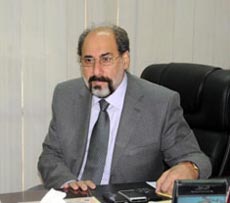 campaign.
campaign.
Dalir Hassan, speaking for the Kurdistan Alliance Block said "We have documents that confirm the involvement of the Mojahedin Khalq organisation in operations against the Kurdish people in Kara Tepe, Khanaqin and Jalula". He added that the MEK were not only active in the north but also against the southern provinces of Al Amareh and Basra during the popular uprising in 1991.
The Vice-Chairman of the Security Committee in the province of Diyala said, "One of the ugliest landmarks left by Saddam Hussein and his regime with the participation of the terrorist MEK organization was his notorious campaign against the Kurds, who named it ‘Anfal’."
*************
The Chairman of the Commission on Security and Defence and Parliamentary leader of the Coalition of State Law, Hassan al-Sanid, said that the Mojahedin Khalq will not return to Camp Ashraf in Diyala province after having been transferred to Camp Liberty near Baghdad. 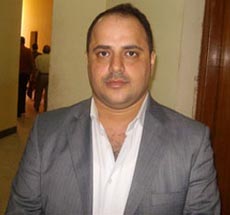
In a statement issued yesterday, the MEK demanded they return to Camp Ashraf where they had spent 26 years.
Al-Sanid said in an interview for Ashraf News, that Iraq will expel the MEK and end their presence on Iraqi territory. He said, "the Iraqi government, in coordination with the United Nations Assistance Mission for Iraq (UNAMI), will act speedily on the mutually agreed resolution and drive them out."
As leader of the Coalition of State Law, he also stressed that the Iraqi constitution does not allow the harbouring of any terrorist group under any name, pointing out that Iraq still considers the group as terrorist. He noted that "the MEK acted as henchmen for Saddam’s intelligence services and practiced many abuses and terrorist operations against the Iraqi people."
Translated by Iran Interlink
Iraq’s Prime Minister Nuri al-Maliki has urged the expedition of MKO members’ expulsion from the Iraqi soil within the framework of the agreement signed with the United Nations.
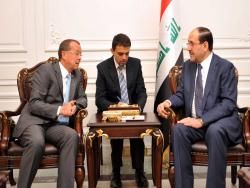
The office of the Iraqi Prime Minister released a statement saying, “In his Monday visit with Martin Kobler head of the UN Assistance Mission for Iraq (UNAMI), premier Nuri al-Maliki underscored the necessity of ending the terrorist MKO group’s presence in Iraq before year-end.”
According to the statement, Maliki urged the United Nations to speed up the closure of MKO’s case in Iraq.
The relocation of roughly 3400 members of terrorist MKO group from Camp Ashraf to Camp Liberty is in line with the memorandum of understanding signed on 25 December between Iraq and United Nations to temporarily transfer them to a former US military base in Baghdad for the UNHCR to determine their refugee status.
Iraq’s forthcoming elections and excluding the country from chapter VII of the UN charter were among other issues discussed at the meeting.
Thursday, 22 November 2012 Habilian
Ending the presence of the MKO in Iraq and the consequences of their remaining in the country are among the main topics discussed in Iraq’s political circles.
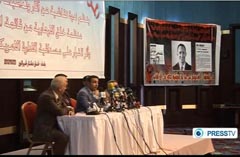 |
| A number of Iraqis have come together to discuss the consequences of the removal of the MKO from the international terrorist Organizations list and its reflections on the country’s future. |
In a conference organized by the Iraqi Center for Media Development, a number of Iraqi officials and ordinary people came together in the capital Baghdad to talk about the efforts of the US government to remove the MKO from the international terrorist organization’s list.
The tribal leaders criticized the silence of the United Nation’s towards this act and said that such step is raising doubts about the US intentions in the region and reveals the US future plans especially against Iran.
The organizers showed frustration toward the intervention of the US government in this issue, saying that the US is putting pressures on the Iraqi officials to keep the MKO in Iraq.
They said the main motive is to use MKO to launch attacks against the neighboring country.
Political observers say that the Iraqi government should take some serious steps toward the expulsion of the MKO.
The group is especially notorious in Iran for having sided with former Iraqi dictator Saddam Hussein during the 1980-1988 Iran-Iraq war.
The attendees have condemned the efforts of the US government’s efforts in removing the MKO from the international terrorist Organization’s list and criticized the response of the United Nations towards such behavior, moreover many political observers have warned of the consequences of the remaining of the MKO in Iraq saying that the step has been taken to keep them in the country.
0Wisam al-Bayati, Baghdad
President Mahmoud Ahmadinejad is to attend the second international conference on global fight against terrorism in the Iraqi capital.
The conference is scheduled to be held in Baghdad in late October attended by countries including Iran, Iraq, Pakistan and Afghanistan.
During his stay in Baghdad, the Iranian chief executive will hold talks with senior Iraqi officials, including President Jalal Talabani and Prime Minister Nuri Al-Maliki, Fars News Agency reported on Saturday.
The first International Conference on the Global Fight Against Terrorism was held in Tehran in late June. Senior officials from at least 60 countries and representatives from several international organizations including the UN attended the two-day meeting.
Iran, having suffered a long record of the killing of its officials in bombings and other acts of terror, mostly carried out by the terrorist Mujahedin Khalq Organization (MKO) regards itself a victim of terrorism.
Out of the 17,000 Iranians killed in terrorist attacks since the victory of the Islamic Revolution in 1979, some 12,000 of them have fallen victim to MKO terrorism.
Members of the MKO fled to Iraq in the 1980s, where they had the support of former Iraqi dictator Saddam Hussein and set up Camp Ashraf in the eastern province of Diyala near the Iranian border.
On September 28, the US formally removed the MKO from its list of terror organizations one week after Secretary of State Hillary Clinton sent the US Congress a classified communication about the move.
Following the delisting, Foreign Ministry said in statement that Tehran strongly condemns Washington’s irresponsible move, which is against the international and legal commitments of the US.
The Islamic Republic holds the US government responsible for the terrorist acts carried out by the MKO in the past, present and the future, the statement added.
The Foreign Ministry also stated that the United States has expressed official support for the terrorist cell with this move, which also proves that Washington follows no logic in its actions.
The European Union also removed the MKO from its list of terrorist organizations in 2009.
Iran Daily
President of the IHRS in the United States says Iraq has the right to close Camp Ashraf, Mujahedin-e Khalq’s paramilitary base in Iraq, and the U.N. is responsible for finding third 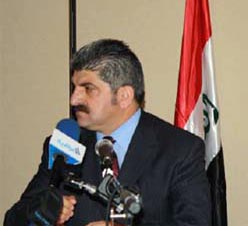 countries for MEK members’ resettlement.
countries for MEK members’ resettlement.
Hamid Murad, president of the Iraqi Human Rights Society in the U.S., told Habilian reporter on Monday that the United States suggested that all the parties and relevant organizations gather data on the Mujahedin-e Khalq terrorists group’s crimes and illegal activities inside Iraq in order to be delivered to the Iraqi courts.
"After an agreement signed between Iraq and the United Nations, this country has the right to close down Ashraf garrison,” he said.
So far, roughly 3000 MEK members have been expelled from Camp Ashraf to Camp Liberty, but still some 200 members are remaining there to “address former residual issues.”
Murad added that the United Nations has to find a third country in order for the MEK members to be resettled there.
